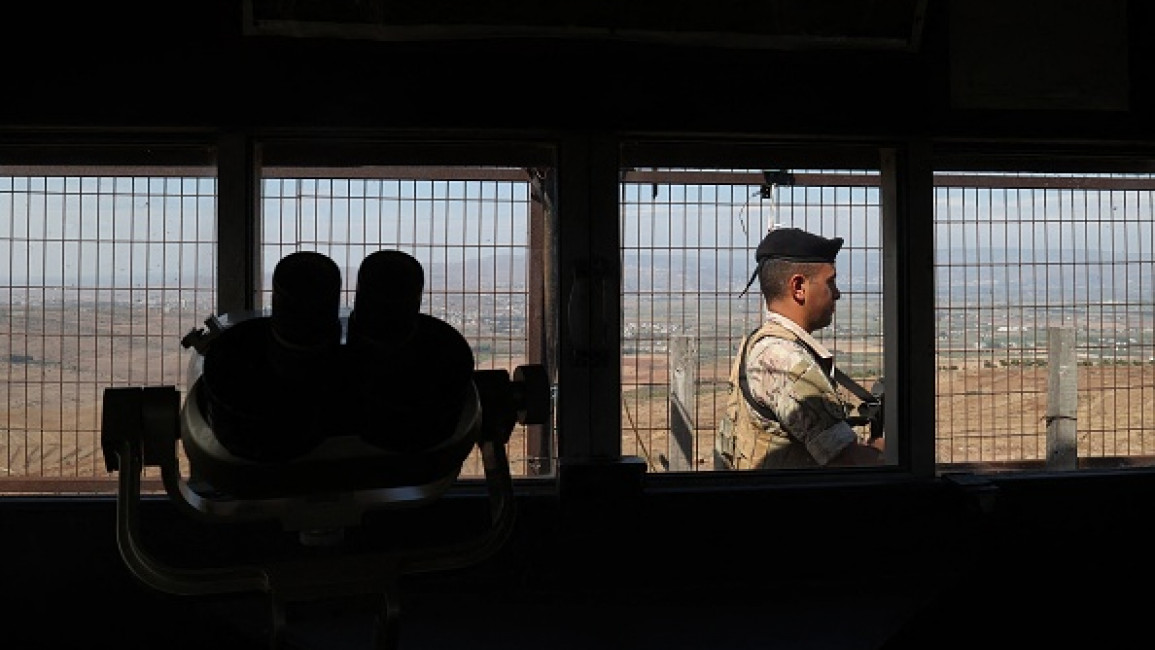Claiming security threats, Syria files complaint to Lebanon over British-funded watchtowers
The Syrian regime has filed a formal complaint to the Lebanese government regarding watchtowers along the border, claiming they posed a threat to Syria’s national security.
Syria’s foreign ministry submitted the "urgent" memorandum to its Lebanese counterpart earlier this week. The memo is expected to be directed to Lebanon’s Ministry of Defence and then to the Lebanese army. An appropriate response will then be sent back to Syria, sources say.
A Syrian military and security delegation is reportedly scheduled to visit Lebanon to hold talks with officials regarding the British-funded observation towers. It is unclear when this visit will take place.
Beirut has not yet publicly commented on the complaint, and this is not the first time the issue has been raised by Damascus since the watchtowers were built.
A source told The New Arab on Saturday that the memo has been received by the Lebanese army, which is preparing a response.
When asked about the timing of this complaint, the source, wishing to remain anonymous, said they were unaware.
"These towers have existed since 2010, and there are [military] centres, not just towers," the source added.
The New Arab emailed the British embassy to Lebanon for comment.
"The UK’s continued support for the Lebanese Army, land border regiments and watchtowers strengthens the Lebanese border against illicit activities including smuggling and protecting both of our countries' national security," the Foreign, Commonwealth & Development Office told TNA.
"We work in close partnership with the Lebanese authorities, ensuring that all projects respect national sovereignty and contribute positively to regional security," it added.
What are these observation towers?
Plans to build the towers date back to as far as 2007. They are intended to help the Lebanese army monitor the porous frontier with Syria to prevent arms and drugs smuggling, human trafficking, among other crime. Following the start of Syria’s war in 2011, the towers became more of a necessity to deter militants from crossing over into Lebanon.
For years, groups that sprung up in Syria’s conflict like the Islamic State (IS) and Nusra Front were holed up in the mountains acting as a natural barrier between Lebanon and Syria, particularly in Lebanon’s rugged northeast. The vast region acted as a haven for the militants until 2017 when they were pushed out by the Lebanese army and Hezbollah during a weeks-long battle.
From Nahr el-Kabir, or "big river," acting as a natural boundary between north Lebanon and Syria, to the slopes of Mount Hermon in Lebanon’s southeast, at the tripoint with the Israeli-occupied Golan Heights, more watchtowers have gradually been installed along the Lebanese-Syrian border – yet to be officially demarcated.
To date, about 80 satellite-linked and heavily fortified towers have been built, and the UK has continued to provide military training and equipment to the underfunded Lebanese army.
Britain had recently proposed installing more of these towers along Lebanon’s border with Israel as part of a long-lasting ceasefire between the enemy states.
Hezbollah and Israel have been engaged in fierce cross-border clashes, the worst since 2006, since the start of the Gaza war on 7 October. Western nations, most notably the US, France, and the UK, have been mediating efforts to end the violence.
Syria’s concerns
The Syrian regime and some of its allies in Lebanon have long complained about the towers, accusing Britain of using them to spy on Syria, something both the British and Lebanese armies deny.
In its recent memo, Damascus has claimed that the towers can detect deep into Syrian territory and collect data from the war-torn country. It says British officers are helping to man the towers, and not just Lebanese personnel.
The regime is reportedly concerned that this data is passed onto Israel, which uses it to help target military sites in Syria.
Israel has carried out hundreds of strikes inside Syria since 2011, targeting the country’s military as well as Iran-backed factions which have supported the regime throughout the war. Several airstrikes in and around Damascus have killed high-ranking Iranian and Hezbollah officials in recent months amid regional flareups over Israel’s war on Gaza.
An unnamed Lebanese government source told the anti-regime Syria TV that Syria’s objection to the watchtowers, particularly at this time, is 'not innocent' and coincides with several important recent developments in the country and region.
The source added that it comes at a time the Lebanese army clamps down on human trafficking networks smuggling refugees across the border, the smuggling of drugs and other contrabands, and monitoring any potential terror threat.
Relations yet to be fully amended
Lebanon has maintained diplomatic ties with its larger, but historically hostile, neighbour.
However, it adopted a so-called policy of dissociation at the onset of the Syrian civil war in 2011. That, as well as US sanctions on the Syrian regime, have put a dampener on official dealings.
Despite Beirut’s official stance of remaining neutral, Iran-backed Hezbollah has fought alongside forces allied with the regime of Syrian dictator Bashar al-Assad and other Iranian and Russian-backed proxies. Hezbollah’s involvement has long been a major point of contention between Lebanon and other Arab states, particularly the Gulf.
Lebanese security officials and politicians have made several visits to Syria in recent years, but almost exclusively in a personal capacity or on behalf of political parties that support the Assad regime.
Lebanon’s former president, Michel Aoun, never paid a single visit to Syria during his tenure between 2016 and 2022, despite his close ties to Assad and Hezbollah.
No Lebanese prime minister has visited Syria in over 14 years.


![Minnesota Tim Walz is working to court Muslim voters. [Getty]](/sites/default/files/styles/image_684x385/public/2169747529.jpeg?h=a5f2f23a&itok=b63Wif2V)




![Debris near Rafic Hariri International Airport [Getty]](/sites/default/files/styles/image_212x120/public/2176162423.jpeg?h=a5f2f23a&itok=XLiO6WHk)
![An Israeli air strike on Jabalia killed teenage journalist Hassan Hamad [Screengrab/X]](/sites/default/files/styles/image_212x120/public/2024-10/hassan%20hamad1.jpg?h=c12e0b96&itok=KstD_5xk)
